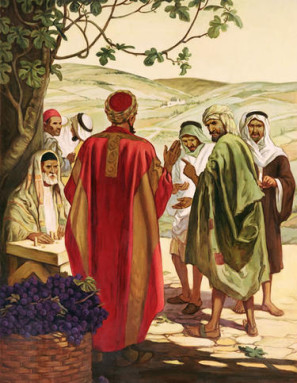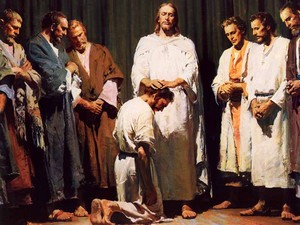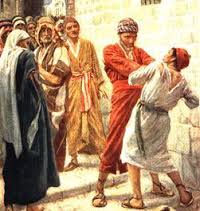Story Starters: From Fr. Tony Kadavil’s Collection
27th Sunday A: Parable of the KOG: Vineyard and Tenants
26th Week: Sept 28-Oct 3
Sept 28 Monday (St. Wenceslaus)
(https://www.franciscanmedia.org/saint-wenceslaus/), Martyr, St. Lawrence Ruiz and Companions, Martyrs) https://www.franciscanmedia.org/saint-lorenzo-ruiz-and-companions/ : Lk 9:46-50: 46 And an argument arose among them as to which of them was the greatest. 47 But when Jesus perceived the thought of their hearts, he took a child and put him by his side, 48 and said to them, “Whoever receives this child in my name receives me, and whoever receives me receives him who sent me; for he who is least among you all is the one who is great.” 49 John answered, “Master, we saw a man casting out demons in your name, and we forbade him, because he does not follow with us.” 50 But Jesus said to him, “Do not forbid him; for he that is not against you is for you.” USCCB video reflections: http://www.usccb.org/bible/reflections/index.cfm
26th Week, Monday, Sept 28
Job 1:6-22 / Luke 9:46-50
Suffering comes to Job: Job remained faithful to God.
26th Sunday A: Words or Deeds?
Opening Story:
“A companion of Francis of Assisi, Brother Juniper is remembered as a “fool for Christ” and there are all sorts of wild stories about his antics. He was notorious for constantly giving his possessions away and living with a winsomeness that sometimes got him in trouble. At one point he was ordered by a superior not to give away his outer garment to the beggars anymore. But it wasn’t long before he met someone in need who asked him for some clothing. He said, “My superior has told me under obedience not to give my clothing to anyone. But if you pull it off my back, I certainly will not prevent you.” (Another version: "I can't give, but you can take.")25th Week: Sept 21-26:
Sept 21 Monday (St. Mathew, Apostle and Evangelist) https://www.franciscanmedia.org/saint-matthew/ : Mt 9:9-13: 9 As Jesus passed on from there, he saw a man called Matthew sitting at the tax office; and he said to him, “Follow me.” And he rose and followed him. 10 And as he sat at table in the house, behold, many tax collectors and sinners came and sat down with Jesus and his disciples. 11 And when the Pharisees saw this, they said to his disciples, “Why does your teacher eat with tax collectors and sinners?” 12 But when he heard it, he said, “Those who are well have no need of a physician, but those who are sick. 13 Go and learn what this means, `I desire mercy, and not sacrifice.’ For I came not to call the righteous, but sinners.” USCCB video reflections: http://www.usccb.org/bible/reflections/index.cfm
25 Sunday A - Liturgical Prayers
"Seek the Lord while he is still to be found,Introduction by the Celebrant
call to him while he is still near," says the prophet.
God himself goes out to seek you,
says the message of today.
May the Lord find you and stay always with you.
R/ And also with you.
A. An Unbelievably Good God
25th Sunday A: The Labourers in the Vineyard and their Master
 Michel DeVerteuil
Michel DeVerteuil General Comments
We have another parable this Sunday, one that many people find particularly difficult to interpret.
As I said in last week’s meditation guidelines, method is always the root problem with interpreting parables, and to adopt the right method we must have a right understanding of what a parable is. It is not the kind of story where we identify “good guys” and “bad guys” and then draw the conclusion that we must imitate the good and avoid being like the bad.
24th Week - Sept 14-19
Sept 14 Monday (The Exaltation of the Holy Cross) https://www.franciscanmedia.org/-Exaltation-of-the-Holy-Cross : John 3:13-17: The Feast of Exaltation of the Holy Cross is one of twelve “Master feasts” celebrated in the Church to honor Jesus Christ, our Lord and Master.
23rd Week: Sept 7-12 Reflections
23 Sunday A: Liturgical Prayers
Jesus tells us today:Introduction b
Where two are three have come together in my name,
there I am among them.
We are here in his name
and so he is among us.
May he always stay with you.
R/ And also with you.
23rd Sunday A: Prayer and Reconciliation
General Comments
 This passage is very different from those of the two previous Sundays. They were dramatic stories, marked by deep emotions and with deep implications for the characters involved. This is a little gem of a passage but with little drama, a very practical, common-sense teaching on that most common and most prosaic of community problems – conflict. It is deep wisdom teaching which continues to be valid for our time. Management has become a science today, and Jesus’ teaching stands up well as a model of how to “manage” conflict in any situation.
This passage is very different from those of the two previous Sundays. They were dramatic stories, marked by deep emotions and with deep implications for the characters involved. This is a little gem of a passage but with little drama, a very practical, common-sense teaching on that most common and most prosaic of community problems – conflict. It is deep wisdom teaching which continues to be valid for our time. Management has become a science today, and Jesus’ teaching stands up well as a model of how to “manage” conflict in any situation.